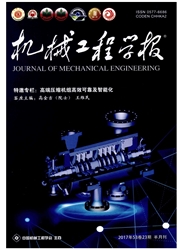

 中文摘要:
中文摘要:
多状态是现代制造装备和复杂工程系统的典型特征。由于多状态系统可靠性理论能反映系统服役阶段状态的复杂衰退规律,近年来受到了广泛的关注和深入的研究。然而,现有的大部分关于多状态系统可靠性理论的研究均假设系统中单元之间的失效规律是相互独立的。但在实际工程中,多种因素所造成的系统单元间失效规律的相关性问题不可避免,故考虑多状态系统中单元载荷的动态变化对单元失效规律的影响,利用马尔科夫模型对存在载荷动态分配机制的多状态系统进行可靠性建模和可靠度计算,分析系统的组成结构和单元的载荷动态分配策略对系统可靠度的影响规律,并在此基础上提出两层遗传算法对多状态系统的结构和载荷分配策略进行联合优化。
 英文摘要:
英文摘要:
Multi-state is one of the characteristics of advanced manufacturing systems and complex engineered systems. Multi-state reliability theory has received considerable attentions in recent years as it is able to characterize the complicated deteriorating process of systems in a finer fashion. Nevertheless, the most reported works on multi-state system reliability modelling and assessment are developed on the premise that the failure processes between any pair of components are statistically independent. In engineering practices, dependency among components of a system is inevitable. By using Markov models, a new reliability model for multi-state systems is developed to take account of the load distribution mechanism between components. The relation among the load imposed on components, reliability of the entire system, and system structure is examined. On the basis of the proposed reliability model, a two-stage genetic algorithm is put forth to optimize the dynamic load distribution strategy and system configuration in a joint manner to achieve better system reliability measures.
 同期刊论文项目
同期刊论文项目
 同项目期刊论文
同项目期刊论文
 A new simulation model for assessing aircraft emergency evacuation considering passenger physical ch
A new simulation model for assessing aircraft emergency evacuation considering passenger physical ch 期刊信息
期刊信息
